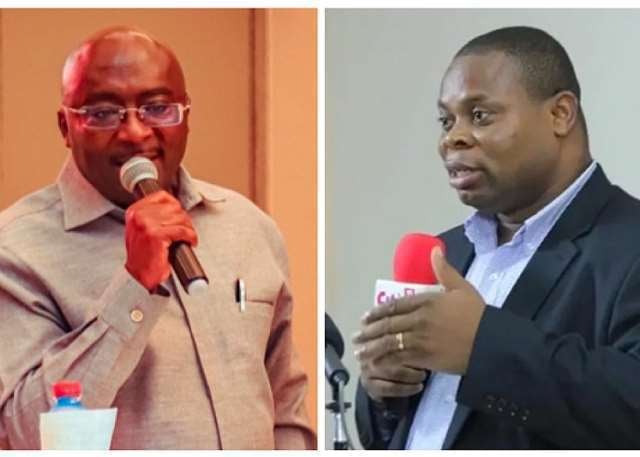Franklin Cudjoe, the Founding President of IMANI Africa, has responded to Dr. Mahamudu Bawumia’s recent admission of the factors contributing to the New Patriotic Party’s (NPP) electoral defeat in the 2020 presidential elections. Dr. Bawumia, the former Vice President and the NPP’s 2024 flagbearer, attributed the loss to a confluence of internal and external challenges during the launch of his nationwide “Thank You” tour. These challenges encompassed economic hardships faced by Ghanaians, ineffective internal party management, unpopular government decisions, and a perception of arrogance of power. Specifically, Dr. Bawumia highlighted the high cost of living, the resistance to reshuffling government officials, the controversial Electronic Transfer Levy (E-Levy), and the implementation of the Domestic Debt Exchange Programme (DDEP) as key factors that eroded public trust and support for the NPP.
Cudjoe, in a social media post, expressed his view that Dr. Bawumia’s admission, while welcome, was belated. He contended that a more timely acknowledgment of these issues could have mitigated the severity of the NPP’s defeat, which saw a 1.7 million vote gap in the presidential race. He suggested that both he and the Asantehene had previously advised Dr. Bawumia to address these concerns during the campaign, implying that ignoring this advice contributed to the scale of the loss. Cudjoe emphasized the importance of leaders demonstrating accountability by addressing challenges proactively rather than offering post-defeat “confessions.” He further questioned the value of the Mike Oquaye report, seemingly commissioned to analyze the election results, suggesting it was a wasted effort given the now-acknowledged reasons for the defeat.
Cudjoe’s critique underscores the importance of timely and transparent communication in political leadership. His assertion that Dr. Bawumia’s delayed admission contributed to the severity of the NPP’s defeat highlights the potential consequences of avoiding difficult conversations during active campaigning. By framing Dr. Bawumia’s acknowledgement as a “confession” rather than a proactive assessment, Cudjoe implies a lack of leadership and accountability within the NPP during the election cycle. His reference to the Asantehene’s advice also suggests that Dr. Bawumia disregarded counsel from influential figures, further reinforcing the narrative of a party leadership that was not fully receptive to feedback or criticism.
The mention of the Mike Oquaye report adds another layer to Cudjoe’s critique. By questioning the report’s usefulness in light of Dr. Bawumia’s admission, he suggests that the party may have engaged in a costly and ultimately futile exercise of post-election analysis rather than addressing the root causes of their defeat. This raises questions about the NPP’s internal processes and their willingness to learn from their mistakes. Cudjoe’s statement implies that the resources and time spent on the report could have been better utilized addressing the issues that ultimately led to their loss.
Furthermore, Cudjoe’s comments highlight the broader issue of public perception and trust in political leadership. The public is often more receptive to leaders who acknowledge shortcomings and take responsibility for their actions. By waiting until after the election to address these critical issues, Dr. Bawumia and the NPP missed an opportunity to demonstrate accountability and potentially regain some public trust. The delay reinforces a perception of disconnect between the party leadership and the concerns of the electorate.
In conclusion, Cudjoe’s response to Dr. Bawumia’s admission serves as a pointed commentary on the importance of timely leadership, transparency, and accountability in politics. His critique underscores the need for political leaders to proactively address challenges, be receptive to feedback, and take responsibility for their actions. The delayed admission, according to Cudjoe, not only contributed to the scale of the NPP’s defeat but also raises questions about the party’s internal processes and its ability to learn from past mistakes. This incident serves as a valuable lesson for political parties and leaders across the spectrum, emphasizing the importance of open communication and proactive engagement with the electorate.














